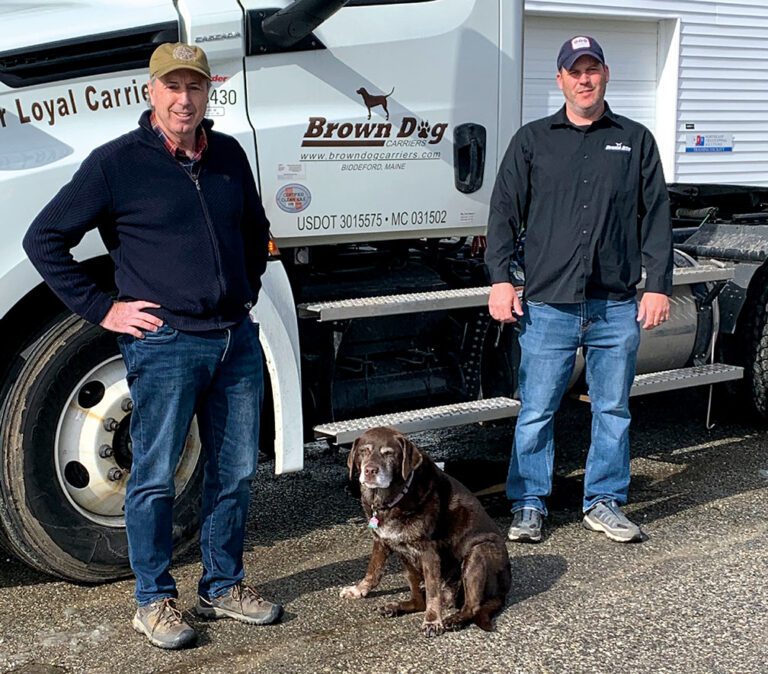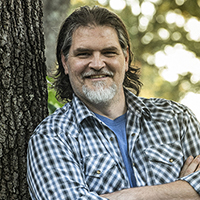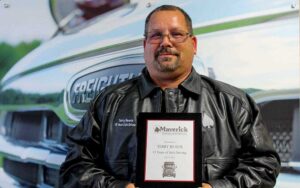At first glance, Brown Dog Carriers and Logistics seems like many other trucking companies. But peel back a layer or two, and you’ll quickly discover the many ways this Biddeford, Maine-based carrier is, in fact, a rare breed in the trucking industry.
“We started the company with the mindset of creating something I would want to work for as a driver,” said Graig Morin, co-founder and president.
“Some of the companies I worked for just didn’t care. I remember with one company, I was simply ‘Number 301’ for a couple years. I’d call in, and you wouldn’t give your name, you’d just say, ‘Truck 301,’” he recalled. “I took the good, bad, and indifferent from every company that I worked for, and I’ve kept that near and dear, starting with this: I don’t want any of my drivers to be a number.”
After 20 years behind the wheel, discovering both what he wanted to emulate and what he wanted to avoid, Morin finally got the opportunity to transport his dream of a different kind of trucking company into reality in 2017. Five years later, the company is growing strong. In addition to its regional focus, Brown Dog delivers across all of the lower 48 states.
“In 2017 we started off with three of us full time. Now we are at 30 drivers, and there’s seven of us full time in the office,” he said. “We specialize in it all. We do some tanker work. We have a bottling plant up here, Poland Spring Water, and we haul water for those guys. We do some refrigerated work for two of our customers. We do a lot of dry van work. We spread the eggs out a little bit.”
What stands out about Brown Dog’s operations isn’t so much the “what” as the “how” and “why.” The company takes its name from Lily Rae Morin, a family pet that passed away recently but remains the model for the company values of loyalty and fidelity to clients and employees alike.
Morin says modeling the company’s mentality after the example of a beloved pet isn’t common, but it caught on.
“I had just sold my prior company and I was doing a little bit of consulting when Graig approached me,” said Darrell Pardy, co-owner in charge of finance and business development. “He was looking to buy a company, so I looked at the numbers. Having owned and run companies for 30-plus years, I said to him, ‘You’d be better off starting your own business than buying somebody else’s company.’ I just didn’t think the values and motivations that Graig had lined up matched the company he was talking about.
“I was so intrigued with what he was doing that I said, ‘Hey, my expertise is in building companies and finance and some marketing. Would you like some help as a partner?’” Pardy shared. “What really attracted me to Graig were his values, especially around community and family. The really good news about it is, within two years we’d eclipsed that other company’s sales volume on our own.”
Lately Brown Dog has been “rolling in clover,” as they say. In 2019, the company enjoyed 70% growth, $2.5 million in sales, and covered 1 million miles. Things haven’t slowed down since. As with any successful business, it takes a lot of behind-the-scenes work. That’s especially true in achieving big-time growth numbers in a way that preserves Brown Dog’s unique small-company mentality.
“One of the things politicians like to do is give you the one-sentence answer to something. The world doesn’t work like that,” Pardy said. “I think one really great strength we have is we don’t get into one kind of channel on a solution. It’s, ‘Here’s the problem, here’s the financial solution to it, here’s the operational solution to it, here’s the safety aspect.’
“It’s never Graig in the room by himself or Darrell and Graig in the room by ourselves. Typically, we’ve got the whole team in here and we’re very open and transparent to our managers. We try to solve things in a multi-dimensional way,” he added.
“It’s been a work in progress,” said Morin. “As we grow, we adjust, such as adjusting policies, which we do constantly. What worked for two or three drivers, does not work for 30. We’re always watching what we’re doing and how we can change things — different policies, different pay structures, you name it. We’ve gone through pretty much everything here in the past month. A lot of our growth came this past year; now we’re catching up to it all.”
The company’s success has helped fuel the philanthropic and service side of the corporate mission. Brown Dog is a staunch supporter of Wreaths Across America, a nonprofit that works to ensure veterans’ graves from coast to coast are decorated during the holidays.
“My grandparents, two of them were World War II veterans; one was Korean War, and my father-in-law was a Vietnam vet. They’ve all since passed away,” Morin said. “When my grandfather died on my dad’s side, I’d take a wreath to his headstone. Then it went from just his headstone to, ‘Well, we might as well raise some money and do the veterans’ section.’ Then, ‘We can’t just do the veterans’ section, it’s got to be the whole cemetery.’ Then, ‘We can’t just do one cemetery, it might as well be five.’
“Then we took the bull by the horns and started working with Wreaths Across America. This is our third year hauling for them,” Morin continued. “I think we did 15 different cemeteries, including Arlington, this year, through the main leg of the national convoy.”
Other charitable work is supported through A Helping Paw, a program through which the company works to “create a world where we whine less and wag more.” A Helping Paw’s work focuses on local needs such as buying jerseys for a local youth hockey team and other initiatives that are the soul of a small town.
“I’m a big believer that, for companies that are successful and for individuals that are successful, a big part of that success is because of where you live,” Pardy said. “During the COVID-19 pandemic, we were trying to do some good stuff around town, helping some of the restaurants that were shuttered and stuff like that. That’s how we created Helping Paw, which is very much aligned with our values of giving and giving back. Where we can help, we want to help.”
It’s all about community — Biddeford, Maine, in particular.
“I’ve lived here my whole life. It’s the town I grew up in, and it’s done a lot for me,” Morin said. “I want to be able to give back to the community, and we’re able to do all these little things that companies should do for their towns. I get enjoyment out of it and I’m glad to be able to help people in this town.”
This article originally appeared in the May/June 2023 edition of Truckload Authority, the official publication of the Truckload Carriers Association.
Dwain Hebda is a freelance journalist, author, editor and storyteller in Little Rock, Arkansas. In addition to The Trucker, his work appears in more than 35 publications across multiple states each year. Hebda’s writing has been awarded by the Society of Professional Journalists and a Finalist in Best Of Arkansas rankings by AY Magazine. He is president of Ya!Mule Wordsmiths, which provides editorial services to publications and companies.








